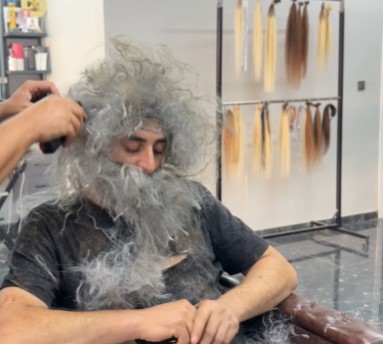For years, Lucien existed in the background—like a forgotten verse in a song no one sang anymore.
He had once worked with pride as a bricklayer, building homes he could never afford, fixing walls while his own life crumbled slowly. After a workplace injury, followed by a layoff and a string of bureaucratic delays, Lucien lost not just his job but also his footing. Rent went unpaid, his belongings were scattered or sold, and eventually, his apartment door locked him out for the last time.
Lyon’s streets became his world.
Each day bled into the next. Lucien wandered aimlessly, coat too thin for the cold, shoes broken at the sole, face weathered by years of wind and indifference. He had stopped looking at his reflection. It no longer resembled the man he remembered. People passed him without acknowledgment—ghosts, shadows, always in a hurry to be somewhere warm and clean.
One September afternoon, Lucien sat beneath the overhang of a bakery, trying to escape the drizzle and the scent of fresh bread that mocked his empty stomach. A young woman approached, her voice soft but steady.
“Excuse me. Would you like a warm drink?”
Lucien looked up. Her eyes didn’t dart away like the others’. She held out a paper cup, steam curling from its rim. He hesitated, then took it.
“I’m Élise,” she said with a gentle smile. “I’m a hairdresser. I work with an outreach group. We offer free haircuts to anyone who needs one. No strings attached.”
Lucien blinked. Haircuts? He hadn’t had one in over a decade. His tangled hair hung in greasy coils, and his beard covered most of his face like a veil. He almost laughed—until he saw that she was serious.
“I… I wouldn’t know where to start,” he mumbled.
Élise nodded. “That’s okay. You don’t have to do anything. Just sit, and I’ll take care of the rest.”
The next morning, Élise and a few volunteers set up folding chairs and mirrors in the corner of a quiet square. Lucien showed up, unsure of why he’d come. Maybe it was the warmth in her voice. Maybe it was the way she looked at him—not through him.
He sat, stiff and silent. Élise draped a clean cape over his shoulders and began carefully detangling his hair.
Each snip of the scissors felt like peeling away a layer of grief. As the hair fell in clumps around his boots, so did some of the heaviness in his chest. Élise worked slowly, methodically, as if rebuilding something from scratch.
She trimmed his beard, washed his face with warm water and gentle soap, and styled his hair in a simple, elegant cut. Then, she handed him a mirror.
Lucien stared.
He touched his jawline, now clean and sharp. His eyes, once sunken, seemed brighter. Beneath the grime and fatigue, there was a man—worn, yes, but still standing.
“I didn’t know I still looked like this,” he whispered.
“You always did,” Élise replied. “It just needed to be uncovered.”
A volunteer snapped a photo—only with Lucien’s permission. She posted it online with the caption: “Dignity isn’t given. It’s remembered.”
Within days, the photo went viral.
Thousands of people commented, amazed by the transformation. But more than the physical change, it was Lucien’s expression that struck a chord: he looked like a man who’d remembered his name after forgetting it for years.
The local news reached out for an interview. A café owner, moved by the post, offered Lucien a part-time job washing dishes. Another organization helped him secure temporary housing. For the first time in years, Lucien slept indoors, under clean sheets, with a locked door that kept the world out.
He visited Élise a week later at her salon.
“I’m not here for a haircut,” he said, standing tall in a borrowed shirt and freshly washed jeans. “I just wanted to thank you.”
Élise smiled. “You don’t have to thank me. You did the hard part.”
Lucien shook his head. “You saw me when no one else did. That’s not nothing.”
With steady support, Lucien began rebuilding his life. He started attending support meetings and reconnected with a distant cousin who invited him to dinner. The café job soon turned into full-time kitchen work. He was trusted. Valued. Seen.
Six months later, Lucien stood at a podium in a community center, addressing a room full of people. It was a fundraiser for homelessness awareness, and he had been asked to speak.
“I used to think I disappeared because I was weak,” he began. “But the truth is, I disappeared because no one looked at me long enough to see I was still there. One act of kindness—a haircut—reminded me I mattered. That someone believed I was worth the effort.”
He paused.
“And that reminder gave me the strength to believe it, too.”
Tears welled in Élise’s eyes as she watched from the crowd.
Lucien finished to a standing ovation. He stepped down from the podium with the quiet confidence of a man who had faced the abyss—and walked back.
That night, he wrote in a journal he now kept by his bedside:
“Hope doesn’t come like a storm. It comes in small things. A voice. A cup of coffee. A pair of scissors. A mirror that finally tells the truth.”
And so Lucien moved forward—not as a project or a miracle, but as a man—rediscovered, not remade.
